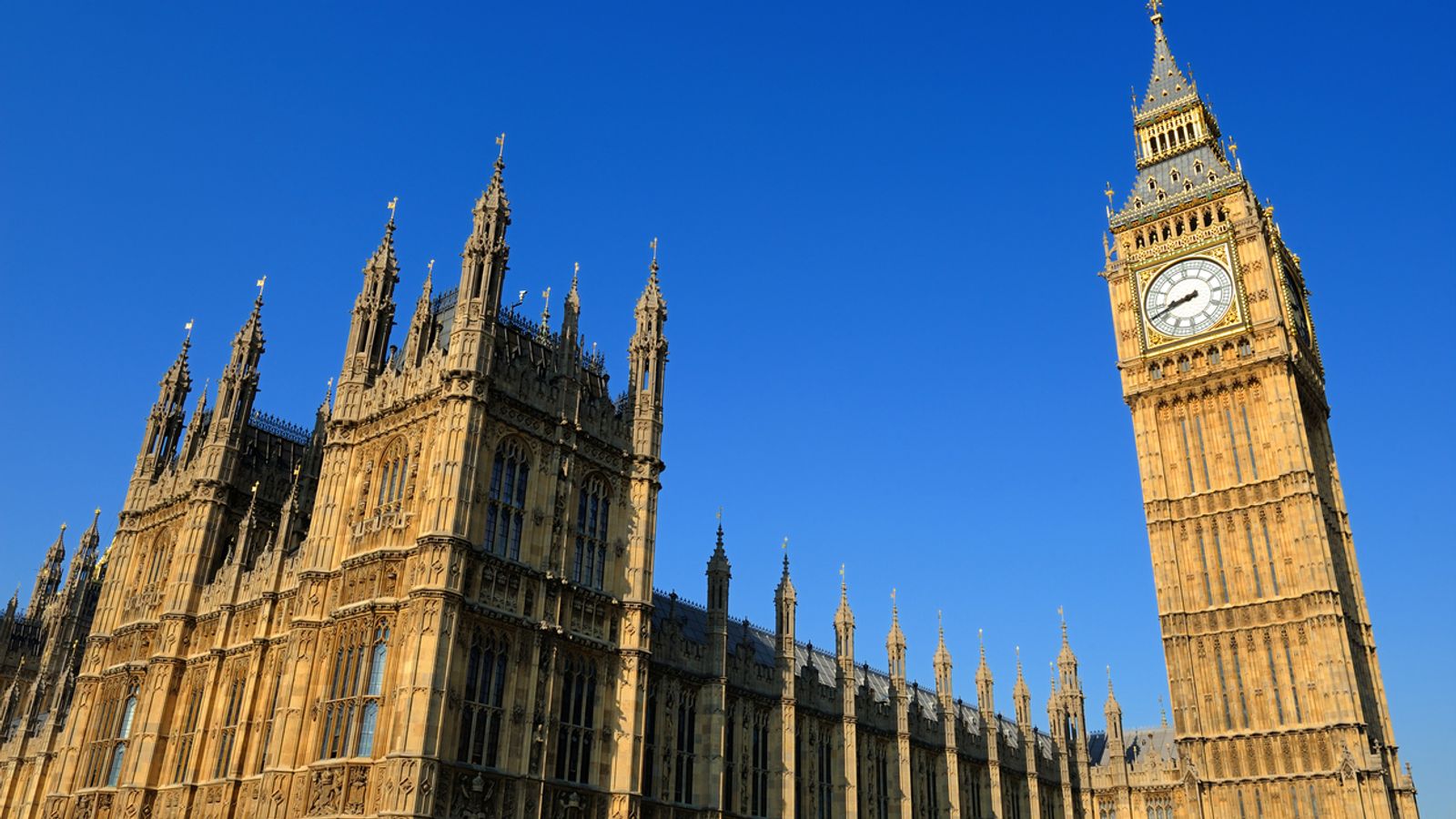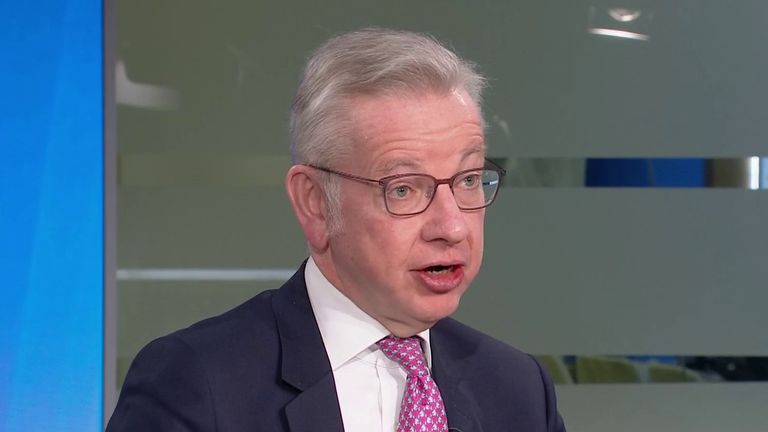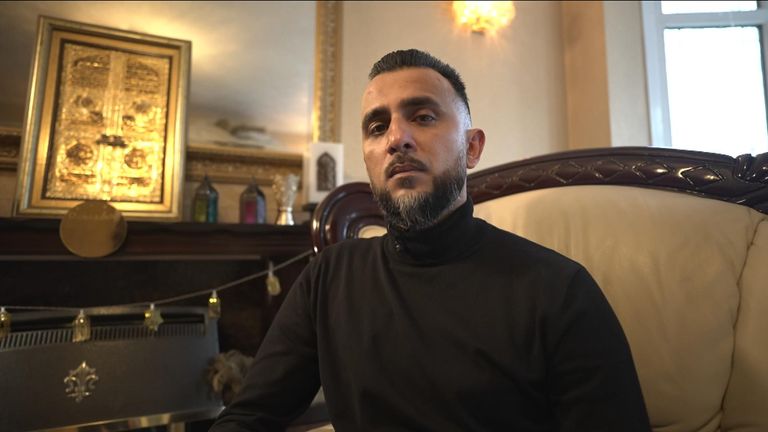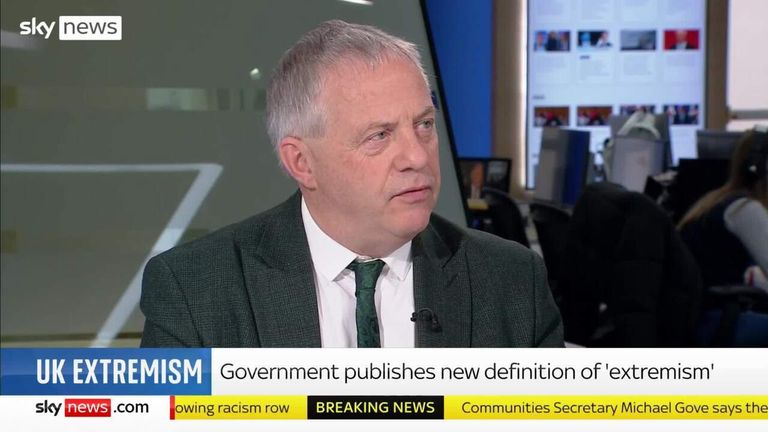The government has unveiled its new definition of extremism as part of a drive to clamp down on Islamist and far-right extremism.
Some have warned the change could have a “chilling effect” on free speech, while others have said it doesn’t go far enough.
How has the definition changed, why has the government done it, and why is it under scrutiny? Here’s everything you need to know.
What is the new definition of extremism?
The definition describes extremism as “the promotion or advancement of an ideology based on violence, hatred or intolerance” that aims to “negate or destroy the fundamental rights and freedoms of others” or “undermine, overturn or replace the UK’s system of liberal parliamentary democracy and democratic rights”.
It also includes those who “intentionally create a permissive environment for others to achieve” either of those aims.
What was the old definition?
The 2011 definition described extremism as “vocal or active opposition to fundamental British values, including democracy, the rule of law, individual liberty and mutual respect and tolerance of different faiths and belief” as well as “calls for the death of members of our armed forces”.
Why has the government changed it?
Communities Secretary Michael Gove told Sky News the new definition is seeking “specifically to respond to the increase in the amount of antisemitism and anti-Muslim hatred that we’ve seen on our streets and social media and elsewhere” since the Israel-Hamas war began.
But he denied suggestions the change was intended to prevent people demonstrating, saying it was “not a restraint on free speech” and only applies to engagement with government.
Essentially, the government’s new definition means organisations that perhaps wouldn’t have fallen under the “extremism category” before will now do so, prohibiting them from being eligible for government support and funding.
“We know that there’s been cases in the past where individual extremist organisations have sought to take advantage of government patronage, money and influence in order to advance their agenda,” Mr Gove said.
“So today’s definition applies only to government and makes it clear that we will keep these organisations at arm’s length so they can’t benefit from access to government and its funds.”
He added the new definition isn’t statutory and is “about making sure that government uses its powers and its money in a wise way”.
Who specifically could be affected?
The government is not expected to publish a list of organisations covered by the new definition today, but have said they will do so in the coming weeks. Members of those groups will then be banned from meeting with ministers or other elected officials and will be unable to receive public money so they do not get a platform that could “legitimise” them through their association with the government.
However, in the House of Commons, Mr Gove has said certain groups will now be assessed against the new definition of extremism, and went on to list some organisations that will be looked at.
These include British National Socialist Movement and Patriotic Alternative. He also names the Muslim Association of Britain, as a British association of the Muslim Brotherhood, Cage and Mend.
Mr Gove insisted groups would only be deemed extremist after “a patient assessment of the evidence” and if they showed “a consistent pattern of behaviour”.
The government says it’s trying to identify all forms of extremism, including far-right groups. But many Muslims fear this will disproportionately affect them.
Why is the change being criticised?
While the new definition is being welcomed by some today, others have warned it could have a “chilling effect on free speech”.
Speaking during Prime Minister’s Questions this week, Miriam Cates, the co-leader of the influential New Conservatives group, said broadening the definition of extremism could have “a chilling effect on free speech”.
“In separating the definition of extremism from actual violence and harm, we may criminalise people with a wide range of legitimate views and have a chilling effect on free speech”.
Angela Rayner responded to Mr Gove’s statement in the House of Commons on behalf of the Labour Party and said: “Given this new definition, the public will rightly be alarmed at the idea that government ministers could already have met with extremist groups.
“Can the secretary of state shed some light on this? Renewed vigilance and diligence, these are welcome, particularly in the current climate, but if its own department now needs to cut ties with extremist groups, it begs the question why they were working with them in the first place.”
She also urged Mr Gove to explain which groups the change will affect and “where the government has chosen to draw the line”.
In response, Mr Gove promised that if an organisation is listed as extremist, the “evidence which leads us to that conclusion and the judgement that we have made will be there for everyone to see”.
Ms Rayner also went on to ask how a new centre of excellence on counter-terrorism will work, and sought confirmation the government will appoint a new adviser on Islamophobia.
Mr Gove replied that the centre of excellence will be staffed by civil servants, with the assistance of academics and academic bodies.
It will also work with the Home Office to ensure the work is “rigorous”.
Conservative peer Baroness Warsi also criticised the move, branding it a “divide and rule approach” intended to “breed division and encourage mistrust”.
And on Wednesday, the Archbishop of Canterbury, Justin Welby, warned the proposals risk “disproportionately targeting Muslim communities”.
A coalition of Muslim organisations echoed the archbishop’s sentiments, adding the move will “vilify the wrong people” and “risk more division”.
Signatories include groups which fear they may fall under the new definition, which has been announced as part of the government’s new counter-extremism strategy.
CAGE International, Friends of Al-Aqsa (FOA), Muslim Association of Britain (MAB), Muslim Engagement and Development (MEND), and 5Pillars say “the proposed definition signals an attack on civil liberties by attacking law-abiding individuals and groups that oppose government policy by labelling them as ‘extremist'”.
A spokesperson for the coalition added: “This new extremism definition is a solution looking for a problem.
“It attacks one of the cherished cornerstones of our pluralistic democracy – that of free speech.
“Anyone, regardless of faith or political colour should be free to criticise the government of the day without being labelled as ‘extremist'”.
‘Doesn’t go far enough’
While some believe the change will have an adverse effect, others have suggested it might not have any real effect at all.
“If you really want to take action against hateful extremism, you need more than a definition for government administration, you need an action plan, you need a strategy,” Darren Jones, shadow chief secretary to the Treasury, has told Sky News.
He called for an update to the countering hateful extremism strategy, which he said is nine years out of date.
The government strategy introduced in 2015 was aimed at “countering all forms of extremism” and improving “our understanding of the causes and impacts of extremism”.
Mr Jones said the process through which groups would be named under the new definition “needs to be clarified”.
“It does seem that the design, the process and the accountability doesn’t seem quite right,” he said.
‘It’s a tweak’
Lord Mann, the government’s independent adviser on antisemitism, has described the new extremism definition as a “tweak”.
“I think it’s probably a helpful tweak,” he told Sky News, but went on to stress the need for it in legislation.
He said he wanted to see the government put “maximum effort” into bringing communities together to tackle division which is “damaging the Jewish community”.
He also urged caution on the “politics of division”, warning that “if there’s division in society, the biggest loser will always be the Jewish community”.
Lord Mann was among a number of signatories who signed a statement this week calling for “as broad a consensus as possible” in facing down extremism, and a guarantee that “no political party uses the issue to seek short-term tactical advantage”.



